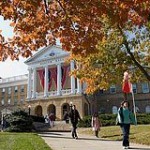Tag Environment
Course adds to environmental awareness
Ph.D. student in literary studies Todd Goddard has found a way to unite his concern for the environment with his teaching. In his section of English 201, he provides 16 students with real-world communications experience while giving 11 local nonprofits some much-needed help. In the process, he helps increase environmental awareness among his students and the audiences they serve.
Muir Knoll facelift to build its storyteller’s tradition
Thanks to gifts, including one from a foundation named for one of Wisconsin's great storytellers, the University of Wisconsin–Madison's scenic Muir Knoll will revive its historic tradition as "Story-Teller's Hill."
Earth Day conference explores Wisconsin’s energy future
The Nelson Institute for Environmental Studies will hold its third annual Earth Day Conference on Wednesday, April 22.
Study reveals potential to amass more carbon in eastern North American forests
With climate change looming, the hunt for places that can soak up carbon dioxide from the atmosphere is on.
Engineering students use EPA funding to conserve water at medical school complex
A group of University of Wisconsin–Madison engineering and science students are working to drastically reduce the amount of water used on the grounds of one of the university's latest building projects, and they've received funding from the U.S. Environmental Protection Agency to do it.
Wind-energy leader Vestas forges partnership with College of Engineering
Vestas, the world's leading producer of wind power technology, has entered into a long-term partnership with the University of Wisconsin–Madison College of Engineering that promises to propel wind-energy research, provide student learning opportunities and give the company a long-term presence in Madison.
Hurricanes not likely to disrupt ocean carbon balance
Hurricanes are well known for the trail of damage and debris they can leave on land, but less known for the invisible trail left over the ocean by their gale-force winds - a trail of carbon dioxide.
Flood seminar seeks to avoid future devastation
Two national experts will join more than a dozen Wisconsin researchers and government officials in April in Madison at a symposium aimed at helping Wisconsin communities avoid devastating floods like those that inundated the Midwest last year.
Dust plays larger than expected role in determining Atlantic temperature
The recent warming trend in the Atlantic Ocean is largely due to reductions in airborne dust and volcanic emissions during the past 30 years, according to a new study.
Green is the trend for UW design students
With the economy in recession and consumers looking to cut costs however they can, it may not seem like the best time to focus on fashion and design. But students in the School of Human Ecology are doing just that in a course focused on creating products and apparel that are not only sustainable, but people actually want to buy.
Predicting the future spread of infectious-disease vectors
As global warming raises concerns about potential spread of infectious diseases, a team of researchers has demonstrated a way to predict the expanding range of human disease vectors in a changing world.
Deep drilling begins for Wisconsin Institutes for Discovery geothermal system
Deep drilling begins this week to place 75 bore holes approximately 300 feet below the site of the future Wisconsin Institutes for Discovery, marking another first for the interdisciplinary research building project.
Study: Can nature’s leading indicators presage environmental disaster?
Economists use leading indicators - the drivers of economic performance - to take the temperature of the economy and predict the future. Now, in a new study, scientists take a page from the social science handbook and use leading indicators of the environment to presage the potential collapse of ecosystems.
Study: Did early climate impact divert a new glacial age?
The common wisdom is that the invention of the steam engine and the advent of the coal-fueled industrial age marked the beginning of human influence on global climate.
Tour UW–Madison with ‘Walk Wisconsin’ on Big Ten Network
Haven't had time to fully explore the University of Wisconsin–Madison campus? Only familiar with the Kohl Center or Camp Randall? Learn more without leaving the comfort of home, as the Big Ten Network (BTN) premieres an hour-long visual mosaic of campus life on Thursday, Dec. 11, at 4 p.m. Central. The program will re-air Wednesday, Dec. 17, at 10 a.m. Central.
Researchers examine role of soil patterns in dam restoration
Looking at the site today, it's easy to forget that a dam and pond stood for 43 years on the University of Wisconsin–Madison's Franbrook Farm Research Station in southwestern Wisconsin. All traces of the structure are gone, and acres of plants, both native and weedy, now carpet the floor of the former basin.
Poll shows Wisconsin residents support wetlands protection
Wisconsin residents are concerned about the destruction of the state's remaining wetlands but don't know much about the wetland types that are most threatened, according to a recent statewide poll.
Climate solutions worth $50,000 in prizes for students
Organizers of a new Climate Leadership Challenge at UW–Madison are seeking the best and brightest ideas from the student body to promote an environmentally sustainable future. They hope the contest will unleash a burst of youthful brainstorming and entrepreneurship across campus.
History of Wisconsin’s wolf policy filled with compromise, meddling
To some, last month's federal decision that put the gray wolf back on the endangered species list in the Great Lakes region was an unmitigated triumph. Siding with the Humane Society of the United States and other groups, the court ruling placed the wolf once again under federal protection after it was removed from the list last March.











